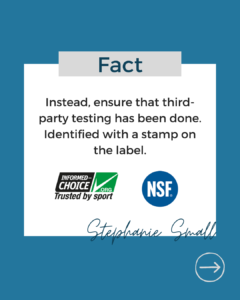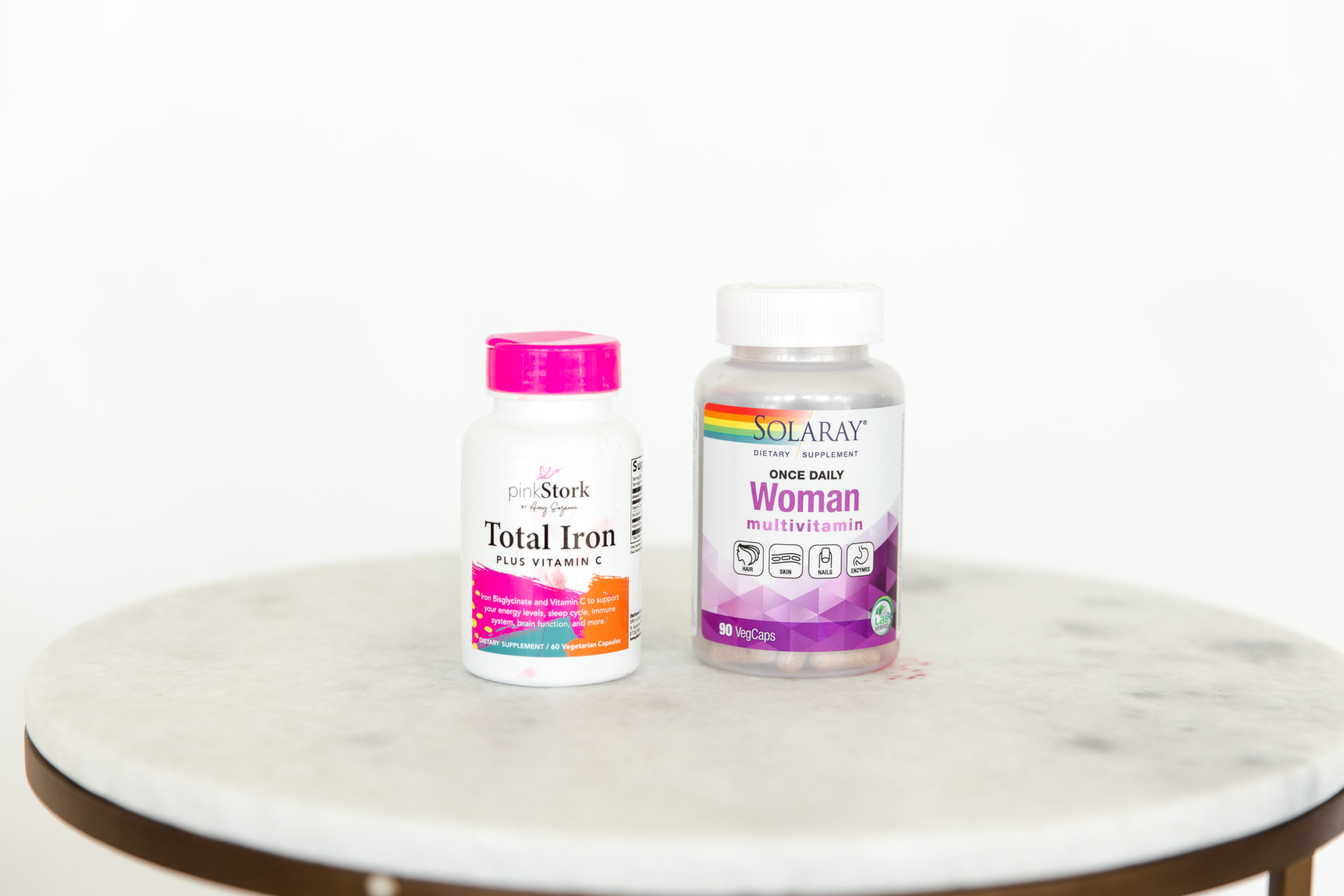Dietary supplements are products that are used to supplements nutrients that we may not get in our daily diet.
The industry is filled with hundreds of supplement types and brands with several potential claims and benefits.
However, the supplement industry is not tightly regulated in some regards, increasing the chances of having a product that is not true to the labels.
It is crucial that you, as a consumer, how to determine which supplements may or may not be safe.
This guide will show you how to choose the highest quality and safest supplement brands, from protein powders to vitamins!
Who Needs Supplements?
Supplements are not inherently necessary or required to be live a healthy lifestyle. As all the required nutrients can be obtained through consuming a balanced and varied diet.
However, in some cases, supplements may be indicated due to increased nutritional needs or increased risk of nutrient deficiency such as (1):
- Those adults or children currently diagnosed with a nutrient deficiency
- Pregnant or breastfeeding women
- Individuals with diagnoses that cause malabsorption
- Disruption of the GI tract
- Inability to meet needs through diet
- Increased dietary needs such as athletes
- Dietary patterns or lifestyles that remove food groups
If you have concerns about consuming adequate nutrients, you must speak with a health care provider to ensure that supplementations are the best option for you.
Regulation of Supplements
Federal law does not require dietary supplements to be deemed safe or checked for quality by the Food and Drug Administration (FDA) (2).
The FDA instead monitors supplement companies’ advertisements and safety monitoring after the supplement enters the market. The FDA ensures that the claims of a dietary supplement are not branded as a cure, mitigation, treatment, or prevention of disease. Additionally, if any harmful side-effects occur, they are to be reported to the FDA (2).
However, companies can opt-in for third-party testing to ensure the quality of the product is what is intended on the label and contains no other harmful chemicals such as lead. Which can occur unknowingly by a company if ingredients are not purchased within the U.S. or are made with bad manufacturing processes.

Third-Party Testing
Third-party testing is not required by federal law before a supplement is sold.
Third-party testing is a voluntary commitment that a company chooses and pays to have their products undergo testing to ensure the ingredients of their products are of quality and are safe.
Third-party testing companies include
- NSF
- USP
- Informed choice
- Banned Substance control group
- Consumer Lab
Additionally, if you are an athlete, products that are NSF Certified for Sport or Informed Choice-Sport ensure that the products are free of the banned substances prohibited by sports organizations.
Third-party testing by these companies includes testing for one or more of the following (3,4):
- Low-risk manufacturing (i.e. cross-contamination preventions, raw material assessments)
- Contamination of the manufactured product
- Supplements contain the ingredients presented on the label
- All of the ingredients are presented on the label.

To obtain the third-party testing label on the supplement, each batch must be tested with additional regular blind testing. If a batch is not tested, then the third-party testing company label will not be presented on the individual label.

Ingredient Efficacy and Safety
Most supplements contain ingredients that are commonly found in foods, but this does not mean that there are additional concerns.
Over-Dosing
There is such thing as too much of a good thing. Your fat-soluble vitamins A, D, and E are stored within the fat cell, which can allow for excessive storage that results in a toxicity risk (5).
On the other hand, water-soluble vitamins are excreted when stores are full, but overdosing has the potential to result in digestive upset or liver damage (6).
This does not even include dietary supplement ingredients that have not been tested for such over-dosing effects.
If you choose to take a supplement, check what the recommended dosage is, if you are deficient, and if there is any toxicity risk related to the ingredients.
Side-Effects
Most minerals and vitamins won’t cause direct side effects. However, it is important to identify if there are any potential interactions with current medications. A common example of this is that Vit E can increase the risk of bleeding (7), so if an individual is on blood thinners this could thin the blood excessively causing harm.
Additionally, other supplements such as caffeine can have negative side effects. Some supplements contain extremely high dosages of caffeine that can result in anxiety, elevated heart rate, or even heart palpitations (8).
Brain-boosting herbs and super-foods are increasing in popularity. Some herbs such as lion’s mane can cause headaches, dizziness, and other negative side effects (9).
Everyone responds to supplements differently. Be cautious of the potential side effects of the ingredients in a new dietary supplement.
Efficacy
Ensure that the efficacy of a dietary supplement is beneficial. If not, then the supplement could be a waste of money.
For example, creatine is recommended to be taken at 5g per day to see beneficial effects, so consuming a creatine supplement that only provides 1g may not be worth the money (10).
Additionally, a company cannot claim that a product cures, treats, or reduced the risk of a disease or condition UNLESS the claims are backed by research (2).
How To Choose A Supplement Brand?
Millions of consumers purchase supplements, it is a multi-billion-dollar industry. Most people are left unharmed. However, companies have been found to have harmful substances in their products, undeclared ingredients that could cause harm, and bogus supplements from unethical companies.
Before you purchase your next supplements, follow these steps to ensure you are staying safe, choosing high-quality products, and not wasting your money.
- Check the ingredients for safety and efficacy – utilize credible sources, research articles, and try to avoid biased information.
- Check the supplement company for third-party testing – check the label or website for the logos of third-party testing companies.
- Check the supplement company for any current lawsuits or notices by the FDA – this can be done by a quick google search.
- Check with a credible health professional to determine if the supplement would benefit you (i.e. a population in need or deficiency is present).

At the end of the day, when shopping for dietary supplements, do your due diligence to protect yourself from harmful substances.
If you want to stay up to date on the most recent research, check out Examine.com where experts provide detailed summaries on the most up-to-date literature.
References:
- Ward, Elizabeth. “Addressing nutritional gaps with multivitamin and mineral supplements.” Nutrition journal vol. 13 72. 15 Jul. 2014, doi:10.1186/1475-2891-13-72
- Food and Drug Administration Web site. https://www.fda.gov/consumers/consumer-updates/fda-101-dietary-supplements. Accessed Jan 2022.
- NSF Web site. “What is Third-Party Certification?”. https://www.nsf.org/knowledge-library/what-is-third-party-certification. Accessed Jan 2022.
- Informed Sports Supplement Certification Web site. “Informed-Sport Certification Process.” https://sport.wetestyoutrust.com/about/certification-process. Accessed Jan 2022.
- Capone K, Sentongo T. The ABCs of Nutrient Deficiencies and Toxicities. Pediatr Ann. 2019 Nov 1;48(11):e434-e440. doi: 10.3928/19382359-20191015-01. PMID: 31710362.
- Hamishehkar, Hadi et al. “Vitamins, Are They Safe?.” Advanced pharmaceutical bulletin vol. 6,4 (2016): 467-477. doi:10.15171/apb.2016.061
- Owen KN, Dewald O. Vitamin E Toxicity. 2021 Nov 14. In: StatPearls [Internet]. Treasure Island (FL): StatPearls Publishing; 2022 Jan–. PMID: 33232043.
- Guest NS, VanDusseldorp TA, Nelson MT, Grgic J, Schoenfeld BJ, Jenkins NDM, Arent SM, Antonio J, Stout JR, Trexler ET, Smith-Ryan AE, Goldstein ER, Kalman DS, Campbell BI. International society of sports nutrition position stand: caffeine and exercise performance. J Int Soc Sports Nutr. 2021 Jan 2;18(1):1. doi: 10.1186/s12970-020-00383-4. PMID: 33388079; PMCID: PMC7777221.
- Kreider RB, Kalman DS, Antonio J, Ziegenfuss TN, Wildman R, Collins R, Candow DG, Kleiner SM, Almada AL, Lopez HL. International Society of Sports Nutrition position stand: safety and efficacy of creatine supplementation in exercise, sport, and medicine. J Int Soc Sports Nutr. 2017 Jun 13;14:18. doi: 10.1186/s12970-017-0173-z. PMID: 28615996; PMCID: PMC5469049.
- I-Chen Li, et al. Neurohealth Properties of Hericium erinaceus Mycelia Enriched with Erinacines. Neurol. 2018; 2018. doi:10.1155/2018/5802634
